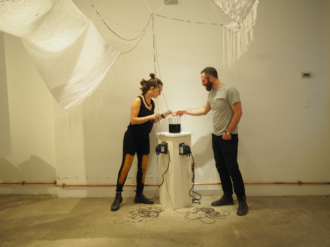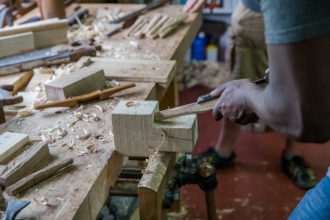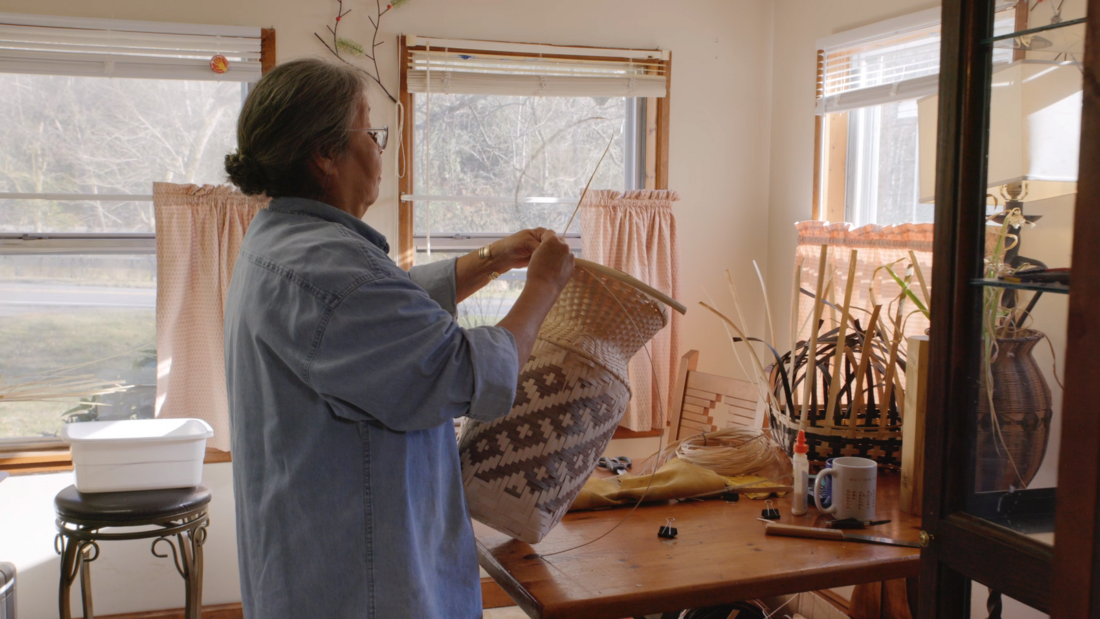If the Center for Craft was a person, it would be nearly 27 years old. And like that experienced adult on the cusp of 30, the Asheville-based nonprofit is especially mindful about the future.
The organization began as a public service center for the University of North Carolina system. But in 2013, it transformed into its current status as an independent nonprofit, dedicated to empowering and supporting artists, organizations and communities across the country through grants, fellowships and programs. As part of this move, the center purchased its historic 1912 building at 67 Broadway.
Despite its decadelong run as a nonprofit, Stephanie Moore, the organization’s executive director, says the center’s identity has continued to evolve.
“It’s taken about 10 years for the organization to catch up with that separation from the university system to be able to be independent and to define a strategic direction without those strings attached,” she says.
Nevertheless, Moore continues, the center remains committed to colleges and universities. “We’re trying to make sure that higher education has the resources and support to prepare students and present good scholarship in craft and also to move forward supporting how craft is showing up in communities across the country,” she explains.
The Center for Craft seeks to accomplish those goals with Craft Matters: A Five-Year Plan. The new strategic direction is centered on activating resources, catalyzing craft communities and amplifying craft’s impact. And while this work is set to run through 2028, Moore says she and her colleagues hope the accomplishments create a lasting influence far beyond the next half-decade.
Meeting of the minds
Since 2002, the Center for Craft has organized a biennial Craft Think Tank to discuss pertinent industry topics with a range of people. And that inaugural gathering established a number of goals that Marilyn Zapf, director of programs, says were gradually met over the previous two decades.
Among the significant boxes checked was the production of a textbook on American craft history — Janet Koplos’ and Bruce Metcalf’s Makers: A History of the Studio Craft Movement, published in 2010 — and the center’s Research Fund, which has supported 223 projects in 39 states, Puerto Rico and the District of Columbia. The accomplishments were meaningful, but at the same time, the craft ecosystem continued to change.
“We needed to understand how the field is evolving and how new trends were arising,” Zapf says. “This led to us to want to host another seminal convening to understand these trends.”
In order to discourage the spread of COVID-19, the 2021 Craft Think Tank was held virtually that October and brought together what Zapf describes as “leaders, artists and thinkers from all over the country.” The distillation of the participants’ insights greatly informed Craft Matters.
“It was things like the emphasis less on a field of higher education and more on how craft is evolving in different communities of practice — higher education being just one of many ways and communities that craft is a part of,” Zapf says.
Also inspiring the shift to supporting nonacademic paths were discoveries gleaned via the Rapid Response Grants that the Center for Craft offered early in the COVID-19 pandemic. The nonprofit disbursed increments of $5,000 to needy organizations and artists throughout the U.S., and in the process its leaders learned that their reach wasn’t as great as they’d thought.
“A majority of those people had never heard about the center,” Moore says. “We realized there was this huge segment of the population that wasn’t aware of our grantmaking or the work we’d done.”
Work in progress
Moore notes that Craft Matters is the first plan that the Center for Craft’s board of directors and staff have created together in the nonprofit’s 25-plus years. Carlo Cuesta and Lindsey Burdick from Minnesota-based consulting firm Creation in Common facilitated the yearlong process. Moore describes the work as “very labored” but also highly investigative in terms of “thinking inward about what is an achievable plan.”
Once completed, Craft Matters was turned into a stylish document by Futures Bright, an Asheville-based design firm. Moore describes the presentation as “sort of rough” and resembling scribbled notes, which she feels accurately represents the Center for Craft’s new direction in ways that a more polished, straightforward presentation could not.

“To me, a strategic plan is a living and working document and something that you play with as you set benchmarks for the future,” Moore says. “But we have no idea in some ways about what this plan will do and where it will take us. I think there was high anticipation and high aspiration in the plan developed by board and staff, but there’s a lot of learning moments that we’ll have to get through to be on the other side of five years.”
In terms of tangible action steps that are likely to bear fruit sooner than others, the Center for Craft is hiring a new staffer to complement its long-running grant programs. Moore says the goal is to broaden the pool of applicants that can apply for grants and ensure that the application process is accessible to a wide constituent base.
As for aspirations with longer timelines, Moore points to the potential for craft “to encourage and revitalize cultural tradition” and promote healing in communities that have been marginalized and/or experienced war and other traumas. The topic is a complex one and an area that she says will involve “a lot of listening and learning” on the staff’s part.
“We were very good at working in higher education. Many of the staff have master’s degrees. We know how to write theses and develop scholarly presentations,” Moore says. “But really working with communities, I think, is a skill and a knowledge that we’re going to have to practice to achieve it.”
Starting local
Fortunately, the Center for Craft has a long history of inclusion to build on. Programming, exhibits and grant opportunities consistently feature and address the needs of underserved communities. And projects such as the 2022ᏔᎷᏣ The Basket — a partnership with members of the Eastern Band of Cherokee Indians that resulted in a parklet outside the nonprofit’s building that features indigenous craft — express a deep desire to engage with the region’s history.
“I think that listening and learning with communities is a commitment to ongoing relationships,” Zapf says.
She notes that she and her colleagues didn’t view ᏔᎷᏣ The Basket as a one-off collaboration but an initiation to deepen and broaden their relationship. In turn, it’s led to partnerships with multiple EBCI organizations.
Zapf adds that while the concept of craft’s role in community vitality is new for the nonprofit, it’s not a new concept — and it has a local resource in UNC Asheville health and wellness professor Ameena Batada to help guide them.
“Dr. Batada has begun to map out how craft enhances social, emotional, physical and economic well-being,” Zapf says. “There’s so many ways that craft impacts our lived experience as a shared community, and we’re starting by listening with our Asheville community.”

The Center for Craft held a well-attended listening session with community members in November, when the nonprofit was reminded of craft’s vibrancy in Asheville in terms of connecting local residents. Of particular note to Zapf was a knitting circle whose members advise one another on which local doctors to consult.
“Craft is helping us knit this social fabric together in ways that we may know intuitively, but we haven’t really begun to understand empirically,” she says. “We’re really excited to lead with Asheville and our local communities to [better] understand [the process], and maybe this work can help other communities advocate for additional resources.”
Moore is also encouraged by insights gained from a recent “CBS Sunday Morning” segment about a group of New York City potters. In addition to exploring the craft, she says the program “got down to the root of happiness and what makes people happy,” and reminded her that craft makes people feel more fulfilled.
“And that experience is not necessarily part of the educational system anymore. And it’s not necessarily part of the tools that parents have at their disposal because we’ve gotten so far away from understanding craft’s value beyond just a commercial object,” Moore says.
“I think that is a really powerful statement for where we are as a society — that we have this tool at our disposal to create happiness and connections with one another in a world that’s becoming extremely isolating.”



Before you comment
The comments section is here to provide a platform for civil dialogue on the issues we face together as a local community. Xpress is committed to offering this platform for all voices, but when the tone of the discussion gets nasty or strays off topic, we believe many people choose not to participate. Xpress editors are determined to moderate comments to ensure a constructive interchange is maintained. All comments judged not to be in keeping with the spirit of civil discourse will be removed and repeat violators will be banned. See here for our terms of service. Thank you for being part of this effort to promote respectful discussion.